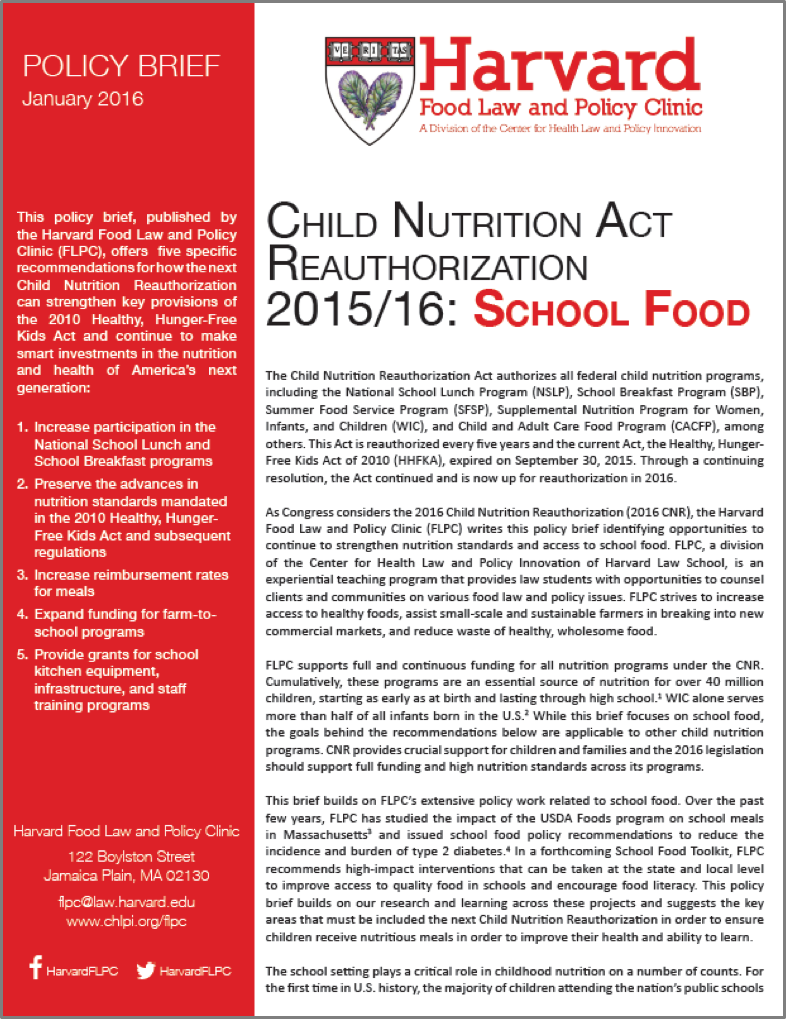The Child Nutrition and WIC Reauthorization Act (CNR) is the centerpiece of federal child nutrition policy. Following a fall legislative session in which progress on the CNR repeatedly stalled, Senate Agriculture Committee leaders promise that it will be a top priority as Congress returns this week. The CNR takes place every five years and establishes the funding and policy for key programs, including the National School Lunch Program, School Breakfast Program, Summer Food Service Program, and Special Supplemental Nutrition Program for Women, Infants, and Children. The last CNR, the Healthy, Hunger-Free Kids Act of 2010 (HHFKA), expired on September 30, 2015. Through a continuing resolution, the Act continued in its current form and is now up for reauthorization. The HHFKA marked a breakthrough in improving the nutritional quality of federally-supported child nutrition programs; among other things, it updated school meal nutrition standards for the first time in over 15 years.
 Today, the Harvard Food Law and Policy Clinic (FLPC) released a policy brief about changes to the CNR that can support healthy school meals. While FLPC strongly supports full and continuous funding for all programs authorized under the CNR, the brief focuses on school food because of FLPC’s extensive policy work in this area and the critical importance of the school setting. Children who participate in school meal programs consume, on average, half of their daily calories at school. School meals also serve an important educational purpose, encouraging children to cultivate healthy eating habits and preferences that will stay with them throughout their lives.
Today, the Harvard Food Law and Policy Clinic (FLPC) released a policy brief about changes to the CNR that can support healthy school meals. While FLPC strongly supports full and continuous funding for all programs authorized under the CNR, the brief focuses on school food because of FLPC’s extensive policy work in this area and the critical importance of the school setting. Children who participate in school meal programs consume, on average, half of their daily calories at school. School meals also serve an important educational purpose, encouraging children to cultivate healthy eating habits and preferences that will stay with them throughout their lives.
FLPC offers five specific recommendations for how the next CNR can strengthen key provisions of the HHFKA and continue to make smart investments in the nutrition and health of America’s next generation:
- increase participation in the National School Lunch and School Breakfast programs;
- preserve the advances in nutrition standards mandated in the 2010 Healthy, Hunger-Free Kids Act (HFFKA) and subsequent regulations;
- increase reimbursement rates for meals;
- expand funding for farm-to-school programs; and
- provide grants for school kitchen equipment, infrastructure, and staff training programs.
Collectively, these recommendations help to ensure that more children are able to consume better meals. Nutritious meals provide countless benefits in both the short and long-term – from supporting children’s cognitive, physical, and emotional develop to reducing their lifetime risk for diet-related diseases. These benefits are, of course, important on the individual level, but they also carry substantial public policy implications such as improved educational outcomes and reduced healthcare spending.
To learn more, check out FLPC’s CNR Policy Brief.


